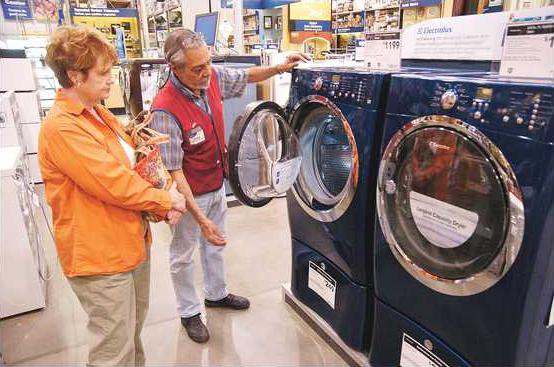1002energyaud
Hear Deron Davis, WaterSense director for the EPD, talk about water-efficient products eligible for the sales tax holiday.With all the recent emphasis on saving gasoline, Georgians may have forgotten that it's important to save energy at home, too.
But if you've been thinking of switching to more energy-efficient appliances, this is the time to buy. Georgia's fourth annual Energy Star sales tax holiday begins at 12:01 a.m. today and runs through midnight Sunday.
The event allows consumers to pay no state or local sales tax on certain products carrying the U.S. Environmental Protection Agency's Energy Star and WaterSense labels.
Georgia's sales tax is 4 cents on the dollar; Hall County's is 3 cents. So on an item costing $1,500, a consumer could save about $105 in sales taxes.
The tax waiver applies only to residential purchases, not to contractors or retailers. There is no limit on the number of items that can be bought, but to qualify for the tax exemption, each item can't cost more than $1,500.
Eligible items, all of which must have an Energy Star or WaterSense label, include dishwashers, washing machines, air conditioners, ceiling fans, fluorescent light bulbs, dehumidifiers, programmable thermostats, refrigerators, energy-efficient doors and windows, high efficiency toilets, bathroom sink faucets and faucet aerators.
To encourage customers to buy during this time, some stores are offering discounts on eligible products.
"The retailers have told us they do see increased sales of these products during this event," said Shane Hix, spokesman for the Georgia Environmental Facilities Authority.
The event is similar to Georgia's sales tax holiday in late July for back-to-school items. Hix said in 2006 the state tried combining the two events, "but retailers wanted it separated out."
Charles Willey, spokesman for the Georgia Department of Revenue, said he didn't know how much money the state loses by not charging taxes during those days.
"We have never put together an estimate of how much it costs the state," he said. "You'd have to put increased reporting burdens on retailers."
Karen Cobb, spokeswoman for the Lowe's Home Improvement store chain, said the tax holiday definitely brings in additional customers.
"It's extremely popular," she said. "At all 61 of our stores in Georgia, we will be having special promotions on Energy Star and WaterSense products, and special signage (pointing out the items)."
With Georgia's ongoing drought, Cobb said, people are happy that the tax holiday has been extended to some water-saving items.
"Water conservation is at the top of their minds for many homeowners," she said. "This is the first year that WaterSense products have been included (in the tax holiday). The WaterSense logo ensures that the product has undergone rigorous testing to make sure it is truly water efficient."
Deron Davis, WaterSense director for the Georgia Environmental Protection Division, said the program is so new that not all the items named in the legislation will be included in the sales tax holiday this year.
For example, showerheads are theoretically eligible, but none currently carry the WaterSense label because the EPA has not yet established criteria for water-efficient showerheads.
Davis said the agency is working with manufacturers to come up with a standard, and showerheads will probably be included in the tax holiday next year.
"(The EPA) started with toilets, because toilets are the biggest water users in the home," he said.
Federal law already requires that new toilets use no more than 1.6 gallons per flush. But to qualify as a WaterSense product, toilets can't use more than 1.3 gallons.
Davis said people still have a lot of misconceptions about water-conserving toilets.
"Prior to the WaterSense program, they were called low-flow toilets. Now they're called high-efficiency," he said. "The technology has improved. There is no longer a problem with flush power. We're in a totally different era as far as that's concerned."
The EPA estimates that if the average household replaces its old toilets with WaterSense models, it could save about $90 a year on water bills.
Similarly, if every household in Georgia installed high-efficiency faucets or faucet aerators, it would save about 5 million gallons of water a day.
And in terms of electricity, most Energy Star products use at least 30 percent less energy than conventional models.
Cobb said it pays off for consumers in the long run.
"(The tax holiday) is an awesome opportunity," she said, "because we're all looking to save money these days."

